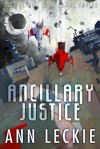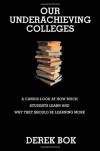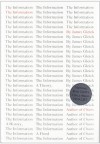Currently reading
McGlue
Knife Fight and Other Struggles
Far from the Tree: Parents, Children, and the Search for Identity
The Good Lord Bird
Ancillary Justice
Our Underachieving Colleges: A Candid Look at How Much Students Learn and Why They Should Be Learning More (New Edition)
Dissident Gardens
Nightmare Movies: Horror on Screen Since the 1960s
The Information: A History, a Theory, a Flood
Complete Novels
Nam-A-Rama
 The stars are rounded from a half-grade. Whether up or down, the author can decide. (You read these, P? You a glass half-empty or half-full sort?) Either way--it's good.
The stars are rounded from a half-grade. Whether up or down, the author can decide. (You read these, P? You a glass half-empty or half-full sort?) Either way--it's good. But let me jump over the qualification, what keeps me from total love and admiration and obsequious pandering to said author about said book. I gotta admit to some nervousness in the opening section, as we're introduced to the exasperated Armstrong and exasperating Gearheardt toward the end of their hyperkinetic war-&-spy hijinks, and they discuss (debate? bicker over) the dense plot we've not yet experienced. This is what they call foreshadowing, right? I felt pretty shaded. A book this plot-heavy needs not to be heavy in its plotting, needs a helium lift to its cartoonish complications and gags, and yet in these first conversations I felt seriously burdened by the weight of the "wacky." Big, complicated plot--I felt like the gunny officer late in the book, listening in on the protagonists piloting their craft into North Vietnam, hearing a lot of noise and detail but not feeling any investment, listening to two men snip and "banter" without any sense of why they like one another or why I should like them. I was seriously pissed, because against my better instincts (to avoid seriously reviewing anything a friend or quasi-friend ["quasi-" means "fake"] had written, to stick to reading and offering up pleasant affirmations, whatever my experience), here I was committed to "currently-reading" and needing to some day, in some way, slip it over into the "read" shelf without causing a stink. (And I felt stupidly compelled to give an honest assessment.)
Part I closed for this reader with a glimmer of hope, a crazed and ineffectual yet wonderfully committed "therapist" promising to fix Armstrong ... and then we shift into Part II, a flashback to the start of it all, trickster Gearheardt delivering pizza to a meeting of the Joint Chiefs with President Larry Bob ... and this section is one of two astonishing bits of writing which sold me on this novel, and this author.
It is hard to be funny, and even harder to write funny: the strain so often shows, and you see the flopsweat and the physical exertion of the writer crafting her or his joke. Or maybe it's just me--I rarely laugh while reading, finding myself too keenly alert to the effort and thus too distracted from the sublime displacement of a great funny line. I suppose (for me) it's akin to reading about magic tricks: interesting, but usually not the same as being magically tricked. And yet there's the rare bird who gets it. Adams and Southern are the hall-of-famers, Christopher Moore and David Sedaris have good batting averages. You can make your own roster. And I'll be adding Jennings to mine. His LBJ is a glorious achievement, a seriously interesting buffoon, a buffoonishly interesting serious character. (I liked him just about as much as Coover's Nixon, and that's high praise from this reader.) Throughout, Part II was all fireworks, an extended glorious performance of Jennings' Strangelovian skill with the seriously silly. E.g., the President, snarling back at a bit of idiocy, says "[t]o the Army chief . . . 'Tom, I get that kind of bullshit advice about every three seconds from those idiots over at the State Department. I don't need to hear it from the soldier boys.'
The Army chief's uniform suddenly became three sizes too big. He squatted behind the couch, a tear running down his face. He did have the presence of mind to later put out a memo changing his name to Tom."
Presto, digito. The book consistently pulls such rabbits out of holes it would be impolitic for this decorous reviewer to note.
The second great section was chapter 12. Chapter 11 had snuck in a bit of serious combat writing, in and around the silly and the bleak and the absurd, as Armstrong experiences on-the-ground combat, and finds himself thunderstruck and horrified. I was impressed, but maybe not as immersed; I found myself recalling other accounts, and here, as in a few other sections, I found the novel good but reminiscent of its great ancestors. But chapter 12, in and around the silly and the bleak and the absurd, turns to combat in the air, and it's as strong, stirring, shattering as any of the greats. I've not read anything so effective at conveying what happens when you pilot a 'copter in for a rescue while under intense enemy fire.
The graft between such heart-stopping and eye-poking doesn't always take, and the junctions of horror and low comedy on occasion dislocate the reader rather than complement (or at the best of moments complicate) one another. But it's a very good novel, not to mention a very good first novel, not to mention a very funny novel (rare indeed). I'll be reading the second.
And there--a real review, not simply blowing smoke, and I avoided the comparison to _Catch-22_.












